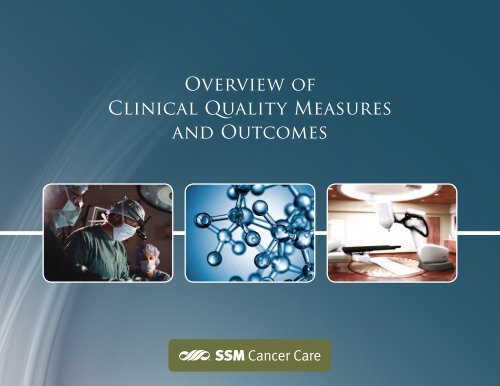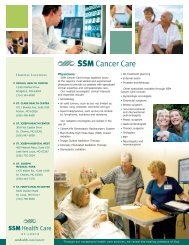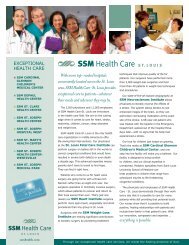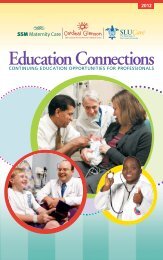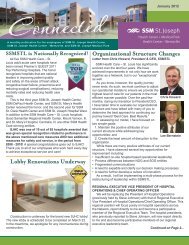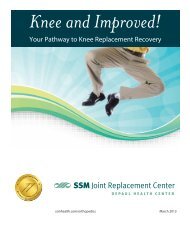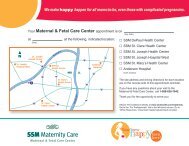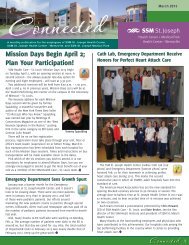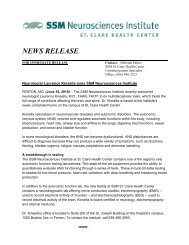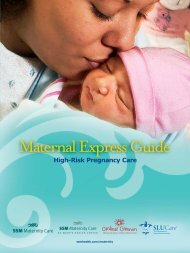Clinical Quality Measures Report - SSM Health Care St. Louis
Clinical Quality Measures Report - SSM Health Care St. Louis
Clinical Quality Measures Report - SSM Health Care St. Louis
Create successful ePaper yourself
Turn your PDF publications into a flip-book with our unique Google optimized e-Paper software.
Overview of<br />
<strong>Clinical</strong> <strong>Quality</strong> <strong>Measures</strong><br />
and Outcomes
Through our exceptional health<br />
care services, we reveal the<br />
healing presence of God.
Introduction<br />
Gaspare Calvaruso, <strong>SSM</strong> Cancer <strong>Care</strong> Service Line Executive<br />
Gaspare Calvaruso<br />
W hen you do something really well, people<br />
seek you out. And when you do it really well<br />
within the local community, you become part<br />
of the fabric of life there. <strong>SSM</strong> Cancer <strong>Care</strong> has<br />
been doing just that in fulfilling its mission of<br />
providing the best in comprehensive cancer<br />
diagnosis and treatment close to home for<br />
thousands of <strong>St</strong>. <strong>Louis</strong>-area residents.<br />
Our vision is to provide high-quality, advanced<br />
cancer care in convenient locations. We<br />
recognize that seeking out and traveling long<br />
distances to obtain needed treatment only adds<br />
to a patient’s burden. We seek to lighten that<br />
burden by offering everything a patient needs,<br />
delivered in a compassionate manner, within<br />
the local community. All locations are accredited<br />
by the Commission on Cancer of the American<br />
College of Surgeons for our comprehensive<br />
program designed to treat the entire person –<br />
physical, emotional, and spiritual, as well as the<br />
many needs of the patients’ families.<br />
<strong>SSM</strong> Cancer <strong>Care</strong> physicians have been educated<br />
in some of the nation’s most revered clinical<br />
settings including M.D. Anderson Cancer<br />
Center, Memorial Sloan Kettering Cancer<br />
Center, the Mayo Clinic, Saint <strong>Louis</strong> University<br />
and Washington University. They then bring<br />
that knowledge back to us in the form of best<br />
practices and keen clinical skills that enhance<br />
the patient experience even more. The fact that<br />
these fine physicians have chosen to practice<br />
with <strong>SSM</strong> Cancer <strong>Care</strong> speaks volumes about<br />
our reputation and provides a solid foundation<br />
on which to build the best possible diagnostic<br />
and treatment capabilities. When combined<br />
with the state-of-the-art equipment and<br />
facilities available at <strong>SSM</strong> Cancer <strong>Care</strong> locations,<br />
patients reap great benefits.<br />
In fact, I am proud to point out that there’s<br />
not much in the way of modern cancer care<br />
that we cannot provide through <strong>SSM</strong> Cancer<br />
<strong>Care</strong> programs. We enjoy powerful and recent<br />
technological innovations in radiation and<br />
other clinical areas. Our industry-leading<br />
technologies include: TomoTherapy®, digital<br />
mammography, PET CT, MammoSite®,<br />
brachytherapy, breast MRI with biopsy<br />
capability, stereotactic breast biopsy, multislice<br />
CTs, image-guided radiation therapy<br />
(IGRT), intensity-modulated radiation therapy<br />
(IMRT), electronic health record (EHR),<br />
computer-aided detection (CAD) and more.<br />
We have our CyberKnife® technology which is<br />
a targeted radiosurgery system that provides a<br />
non-invasive alternative to surgical treatment<br />
of tumors.<br />
In addition <strong>SSM</strong> Cancer <strong>Care</strong> has an affiliation<br />
with Saint <strong>Louis</strong> University that benefits our<br />
patients and physicians by allowing for our<br />
participation in clinical research trials. In this<br />
way, <strong>SSM</strong> Cancer <strong>Care</strong> is not only providing<br />
current best practices, but is helping to<br />
transform and improve the future of cancer<br />
treatment. Research trials will be conducted<br />
in <strong>SSM</strong> Cancer <strong>Care</strong> facilities, and subjects will<br />
enjoy the same convenience that they do to<br />
obtain other services.<br />
This type of activity points to the high level<br />
of care coordination that is a hallmark of <strong>SSM</strong><br />
Cancer <strong>Care</strong>. Our physicians and other clinical<br />
specialists and staff communicate throughout<br />
the system with a powerful electronic health<br />
record (EHR) that provides complete and<br />
instant access from any Internet-equipped<br />
computer. Notes, lab results and images are<br />
shared and care is coordinated by a team of<br />
providers who are intent on ensuring that a<br />
patient receives appropriate and complete<br />
care without the unnecessary duplication of<br />
services. The EHR also collects information that<br />
can be examined for important data trends and<br />
outcomes, allowing for internal monitoring<br />
and adjustments to guarantee the use of best<br />
practices in an efficient setting.<br />
Compassion, <strong>Quality</strong>, Convenience. These are<br />
the watchwords by which we guide <strong>SSM</strong> Cancer<br />
<strong>Care</strong>, and we look forward to continuing this<br />
tradition and changing lives along the way. We<br />
remain committed to our mission: “Through our<br />
exceptional health care services, we reveal the<br />
healing presence of God.”
Letter<br />
from Aislinn Vaughan, MD, Medical Director, <strong>SSM</strong> Breast <strong>Care</strong><br />
Aislinn Vaughan, MD<br />
<strong>SSM</strong> Breast <strong>Care</strong> is making great strides to<br />
improve the patient experience across the<br />
<strong>SSM</strong> Cancer <strong>Care</strong> network. The Breast <strong>Care</strong><br />
<strong>St</strong>eering Committee meets every two months<br />
to review mammogram, biopsy and cancer<br />
statistics at each site in order to identify issues<br />
that need improvement. This multidisciplinary<br />
group includes physicians, nurses and ancillary<br />
personnel. Together, we strive to provide<br />
excellence for our patients and care that is<br />
beyond expected standards.<br />
Nurse navigators, also known as breast health<br />
specialists, work at each location and are<br />
integral to caring for patients who require<br />
biopsy. They communicate with the ordering<br />
physician, are often present for the biopsy<br />
procedure, and follow up with the patient. They<br />
also assist with the coordination and facilitation<br />
of breast cancer support groups. The nurse<br />
navigators document ordering physicians’<br />
preferences and continually add to a growing<br />
database of information that helps streamline<br />
the ordering process.<br />
Core needle biopsy has become the care<br />
standard at our facilities, and only rarely does<br />
a patient require surgical biopsy. Across <strong>SSM</strong><br />
Breast <strong>Care</strong>, our core needle biopsy rate is over<br />
94 percent and is currently better than the<br />
national average. See page 15.<br />
Along the same line, minimally invasive staging<br />
of the axilla is becoming standard procedure.<br />
<strong>SSM</strong> Breast <strong>Care</strong> has implemented a policy<br />
for all patients with a BIRAD category 4c or<br />
5 mammogram/ultrasound that calls for an<br />
axillary ultrasound as well. This allows needle<br />
biopsy of any suspicious lymph nodes, often<br />
in conjunction with the breast lesion biopsy.<br />
A positive lymph node saves the patient the<br />
surgical step of a sentinel lymph node biopsy,<br />
and is particularly useful when chemotherapy is<br />
prescribed prior to definitive breast surgery in a<br />
neoadjuvant fashion.<br />
The U.S. Preventive Services Task<br />
Force (USPSTF) made controversial<br />
recommendations in 2009 that suggested<br />
women of average risk begin annual screening<br />
mammograms at age 50. Along with many<br />
respected national organizations that focus<br />
on cancer care, <strong>SSM</strong> Breast <strong>Care</strong> disagrees<br />
with this recommendation. We continue to<br />
recommend annual screening mammography<br />
starting at age 40 for most women. Those<br />
identified to have a higher risk may require<br />
earlier annual exams and/or breast MRI.<br />
Screening rates have decreased across the<br />
network, while our statistics indicate an<br />
increase in patients presenting with<br />
<strong>St</strong>age II and III disease. We maintain that the<br />
only way to improve this diagnostic statistic<br />
and create better patient outcomes is to<br />
encourage annual screening mammography<br />
beginning at age 40.
Letter<br />
Keith Naunheim, MD, Medical Director, <strong>SSM</strong> Cancer <strong>Care</strong>, Thoracic Oncology<br />
Keith Naunheim, MD<br />
When diagnosing and treating the lung<br />
and esophagus, <strong>SSM</strong> Cancer <strong>Care</strong> physicians<br />
and staff can choose from a variety of<br />
techniques that promise accuracy and<br />
efficacy. These include lung-volume reduction<br />
surgery, esophageal cancer treatment, lung<br />
cancer surveillance, video-assisted thoracic<br />
surgery (VATS), thoracoscopic surgery,<br />
stereotactic radiosurgery, and robotic surgery.<br />
We offer the CyberKnife® <strong>St</strong>ereotactic<br />
Radiosurgery System, a noninvasive outpatient<br />
treatment for otherwise inaccessible lung<br />
lesions. This procedure has become known for<br />
its highly effective targeting technology while<br />
offering a low risk and complication rate.<br />
Using the technology, we are able to target<br />
and deliver radiation to tumors while sparing<br />
surrounding tissue.<br />
medical oncologist, physicist, radiation<br />
therapy technicians, nurses and other<br />
healthcare professionals.<br />
Patients needing a more invasive form of<br />
treatment may be candidates for VATS, which<br />
saves the patient from traditional thoracotomy<br />
or sternotomy. Patients presenting with<br />
<strong>St</strong>age I and II cancers that require lobectomy<br />
with lymphadenectomy and those with<br />
peripheral lung tumors that can be removed<br />
by wedge resection may be VATS candidates.<br />
The procedure uses CT visualization, and<br />
percutaneous CT-guided localization wires<br />
help identify tumorous lung nodules. In this<br />
way, the wires are used to assist VATS in cases<br />
that require sublobectomy resection.<br />
Minimally invasive laparoscopic procedures<br />
are also offered through <strong>SSM</strong> Cancer <strong>Care</strong>.<br />
Patients undergoing laparoscopy generally<br />
heal faster and experience less post-surgical<br />
pain. Complication rates are lower, hospital<br />
stays are shorter and patients sooner return<br />
to normal activities.<br />
Using this range of treatment options,<br />
our physicians are able to provide positive<br />
outcomes for our patients. Cases are discussed<br />
and reviewed by our Thoracic Oncology<br />
<strong>St</strong>eering Committee, which brings together<br />
the expertise and experience of our clinical<br />
team to collaborate on each case in order to<br />
ensure excellent care. We are proud to offer<br />
the most recent advances that have made<br />
lung cancer treatment more effective,<br />
offering hope to our patients.<br />
Treating lung cancer patients with CyberKnife,<br />
as opposed to more invasive or less precise<br />
procedures, results in improved quality of life for<br />
the patient and increased accuracy and access<br />
for the physician. The CyberKnife clinical team<br />
is outstanding. Specialists who work together<br />
include a surgeon, radiation oncologist,<br />
We are proud to offer the most recent advances that have<br />
made lung cancer treatment more effective, offering hope<br />
to our patients.
Letter<br />
Alvin Schergen, MD, Cancer Committee Director, <strong>SSM</strong> Cancer <strong>Care</strong>, South Region<br />
Alvin Schergen, MD<br />
Offering patient support<br />
services and access to<br />
national resources are<br />
among the priorities we<br />
are pursuing as a group.<br />
Working under the banner of the South Region,<br />
<strong>SSM</strong> <strong>St</strong>. Mary’s <strong>Health</strong> Center recently received<br />
full three-year certification as a “community<br />
hospital comprehensive cancer program”<br />
from the American College of Surgeons<br />
Commission on Cancer.<br />
<strong>SSM</strong> <strong>St</strong>. Clare <strong>Health</strong> Center, the other<br />
comprehensive health care facility in the South<br />
Region, boasts some of the newest innovations<br />
in patient care and communication, and we<br />
anticipate future Commission on Cancer<br />
certification will be given to South Region<br />
facilities as a single entity, recognizing our<br />
shared leadership and technologies.<br />
Beyond the <strong>SSM</strong> <strong>St</strong>. Mary’s and <strong>SSM</strong> <strong>St</strong>. Clare<br />
<strong>Health</strong> Centers, the South Region works with<br />
<strong>SSM</strong> Cancer <strong>Care</strong> colleagues on multidisciplinary<br />
task forces through which we share best<br />
practices and provide collaborative services.<br />
For instance, our breast care program involves<br />
cooperative efforts between breast surgeons,<br />
diagnosticians and nurse navigators across the<br />
entire <strong>St</strong>. <strong>Louis</strong> and <strong>St</strong>. Charles County area.<br />
Similarly, we’re working to create a collaborative<br />
lung cancer program that will combine the best<br />
of the entire <strong>SSM</strong> Cancer <strong>Care</strong> family.<br />
The South Region provides patients with<br />
some of the best diagnostic and treatment<br />
technologies available. These include our use<br />
of endoscopic ultrasound, brachytherapy and<br />
MammoSite®. Surgeons specializing in breast<br />
care perform procedures in our facilities,<br />
offering a depth of knowledge and experience.<br />
We also continue to develop ancillary services<br />
across facilities. Offering patient support<br />
services and access to national resources<br />
are among the priorities we are pursuing as<br />
a group. And we are taking our expertise to<br />
patients outside the immediate service area<br />
through outreach at Hermann Regional Hospital<br />
in Hermann Area District Hospital in Hermann,<br />
MO, where patients can see our physicians at<br />
specialty outreach clinics. The early success<br />
of these efforts are leading us to consider<br />
expanding the outreach program to other<br />
rural facilities.<br />
The South Region’s recent growth also has<br />
resulted in the need for additional clinical space.<br />
We are planning for a new outpatient center<br />
that will allow for continued growth of our<br />
cancer care services.<br />
Finally, with continued growth comes the<br />
need for additional physicians and mid-level<br />
providers. We are pleased to welcome several<br />
new colleagues to <strong>SSM</strong> Cancer <strong>Care</strong> in the<br />
South Region.
Letter<br />
Dan Luedke, MD, Cancer Committee Director, <strong>SSM</strong> Cancer <strong>Care</strong>, <strong>St</strong>. Charles County<br />
Dan Luedke, MD<br />
<strong>St</strong>. Charles County is becoming a hub for exciting<br />
advances in cancer care. <strong>SSM</strong> <strong>St</strong>. Joseph <strong>Health</strong><br />
Center, <strong>SSM</strong> <strong>St</strong>. Joseph Medical Park and <strong>SSM</strong><br />
<strong>St</strong>. Joseph Hospital West offer many of the most<br />
advanced treatments available, performed by<br />
some of the area’s most talented physicians.<br />
One particular program that is unique to this<br />
area is the International Early Lung Cancer<br />
Action Program (I-ELCAP). <strong>SSM</strong> Cancer <strong>Care</strong> at <strong>St</strong>.<br />
Joseph <strong>Health</strong> Center is currently the only facility<br />
in the state to serve as an I-ELCAP screening site.<br />
However <strong>SSM</strong> Cancer <strong>Care</strong> at <strong>St</strong>. Clare <strong>Health</strong><br />
Center will become a screening site in 2012.<br />
At <strong>SSM</strong> <strong>St</strong>. Joseph <strong>Health</strong> Center, I-ELCAP<br />
has been underway for five years and is an<br />
international collaborative effort to study<br />
early diagnosis of lung cancer using low-dose<br />
screening CT of the chest paired with smoking<br />
cessation programming. To date, we have<br />
conducted about 500 screening exams at <strong>SSM</strong> <strong>St</strong>.<br />
Joseph <strong>Health</strong> Center and have detected about<br />
nine early lung cancers as a result. These patients<br />
were diagnosed with <strong>St</strong>age I disease, underwent<br />
lung resection, and are now disease-free. I-ELCAP<br />
data show that patients treated for <strong>St</strong>age I<br />
disease have a 78 percent survival rate at five<br />
years, compared to a 15 percent five-year survival<br />
rate for those who are not diagnosed early.<br />
In addition, CT radiation doses have decreased,<br />
and our ability to read the images accurately<br />
has increased in the past several years,<br />
resulting in fewer procedures performed on<br />
benign cases. Our clinicians are trained to<br />
read scans using the I-ELCAP method, which<br />
results in more accurate interpretation, fewer<br />
unnecessary procedures and better care for<br />
patients who are diagnosed with malignancies.<br />
Another example of the technological<br />
advancement available to our physicians<br />
and patients is the endobronchial ultrasound,<br />
a relatively new procedure that allows us to<br />
perform transbronchial needle aspiration.<br />
Using this non-surgical, outpatient technique,<br />
we can obtain tissue or fluid samples from the<br />
lungs and nearby lymph nodes. No incisions<br />
are needed as we insert the bronchoscope<br />
through the mouth. A special endoscope<br />
with an ultrasound processor and a<br />
fine-gauge aspiration needle are guided<br />
through the trachea. Rapid onsite pathologic<br />
evaluations are possible with this fast and<br />
accurate procedure.<br />
Within our service area, we continue to strive for<br />
standardized care that meets the guidelines of<br />
the National Comprehensive Cancer Network<br />
for diagnosis, treatment and follow-up care. Our<br />
goal is to create an environment in which our<br />
entire team provides consistent, high-quality<br />
care. Our patients can expect the same excellent<br />
care experience at any of our facilities.<br />
To this end, we focus on a multidisciplinary<br />
approach to care coordination, and the<br />
system-wide electronic health record allows us<br />
to be consistent in monitoring and providing<br />
care across facilities. Thus, we are creating a<br />
multidisciplinary and multicentric system,<br />
but one in which quality is consistently high.<br />
Demonstrated outcomes are shared in order<br />
to improve practice across the network, and<br />
performance standards help guide our<br />
clinical practice.<br />
We feel confident that continuation of these<br />
efforts will further enhance the physician and<br />
patient experience, making <strong>SSM</strong> Cancer <strong>Care</strong><br />
locations in <strong>St</strong>. Charles County outstanding<br />
places to provide and receive cancer care.<br />
Our goal is to create an environment in which our entire team provides consistent, high-quality care. Our patients can<br />
expect the same excellent care experience at any of our locations.
Letter<br />
Daniel Cuevas, MD, Cancer Committee Director, <strong>SSM</strong> Cancer <strong>Care</strong>, DePaul <strong>Health</strong> Center<br />
Serving as chairman of Medical Oncology and<br />
statistical trends, evaluate patient care<br />
the da Vinci® Surgical System for minimally<br />
Hematology at <strong>SSM</strong> DePaul <strong>Health</strong> Center, I<br />
and treatment, and predict future<br />
invasive, robotic-assisted procedures; the<br />
am pleased and proud to work with a diverse<br />
geographic growth.<br />
TomoTherapy Hi•Art System®, which delivers a<br />
team of experts in fields including pathology,<br />
very sophisticated form of intensity-modulated<br />
radiation oncology, radiology, surgery, palliative<br />
Patients also are followed for the purpose of<br />
radiotherapy (IMRT), and combines treatment<br />
care, pulmonary medicine, medical oncology,<br />
continuous medical surveillance, documenting<br />
planning, CT image-guided patient<br />
pastoral care, oncology data services, breast<br />
subsequent treatments and/or recurrence<br />
positioning and treatment delivery into<br />
imaging services, hospice, clinical education,<br />
throughout the patient’s life. This data is<br />
one integrated system; and MammoSite®,<br />
nutrition, community health and care<br />
compiled and used to provide end results<br />
a patented process in which radiation is<br />
Daniel Cuevas, MD<br />
coordination. The fine physicians, nurses and<br />
other specialists on this multidisciplinary team<br />
and survival statistics. We are proud to note<br />
that the follow-up rate continually meets<br />
delivered into the breast after a tumor has<br />
been removed through a lumpectomy.<br />
work together, recognizing the importance of<br />
CoC requirements.<br />
Our values<br />
all to benefit the individual patient.<br />
Physicians are well aware that cancer care<br />
The resources provided through <strong>SSM</strong> Cancer<br />
<strong>Care</strong> are available to our clinicians and<br />
• Compassion. We reach<br />
out with openness, kindness<br />
and concern.<br />
• Excellence. We expect the<br />
best of ourselves and one<br />
another.<br />
• <strong>St</strong>ewardship. We use our<br />
resources responsibly.<br />
• Respect. We honor the<br />
wonder of the human spirit.<br />
• Community. We cultivate<br />
relationships that inspire<br />
us to serve.<br />
The final value listed at right, community, is<br />
evident in the engaged and vigorous medical<br />
setting in which we are privileged to operate.<br />
Our clinical colleagues understand the benefits<br />
of collaboration and communication from<br />
diagnosis through follow-up care. This<br />
collaborative process is evident in the<br />
individualized care approaches we create<br />
for our patients.<br />
The oncology committee follows standards<br />
mandated by the Commission on Cancer (CoC),<br />
meeting regularly as required. Oncology data<br />
services tracks demographics, site specification,<br />
continually changes to include an array of<br />
new technologies, procedures, medications<br />
and supportive services. As health care<br />
professionals, we must understand and be<br />
prepared to incorporate these advances<br />
into our practice for our patients’ benefit.<br />
We are able to share the latest findings and<br />
developments in our various specialties in<br />
order to enhance the patient experience and<br />
provide superior care in a coordinated fashion.<br />
Multidisciplinary cancer conferences and our<br />
annual oncology symposium keep physicians<br />
abreast of new developments that may affect<br />
their work. In addition, physicians communicate<br />
patients, creating a complete service line<br />
with the breadth and depth needed to<br />
successfully diagnosis and treat virtually<br />
any type of malignancy.<br />
The continuum of support following treatment<br />
— such as counseling, discharge planning,<br />
hospice, nutrition, pastoral care and support<br />
groups — is also crucial to patient success and<br />
are an important component of every overall<br />
cancer care plan.<br />
Residents of the northern portion of the <strong>SSM</strong><br />
<strong>Health</strong> <strong>Care</strong> - <strong>St</strong>. <strong>Louis</strong> service area are well<br />
histology, staging, treatment and survival<br />
regularly with colleagues via electronic<br />
served through the continuing efforts of the<br />
information. The data collected is readily<br />
messaging and information sharing.<br />
fine physicians and staff who provide <strong>SSM</strong><br />
available and allows analysis of anatomical<br />
Cancer <strong>Care</strong> services at DePaul <strong>Health</strong> Center.<br />
sites, stage, histology, procedures, treatment<br />
Our facilities boast some of the most advanced<br />
and survival. It is used to analyze current<br />
technologies currently available, such as
Multidisciplinary <strong>Care</strong><br />
and the Tumor Conference<br />
Regardless of the type of cancer diagnosed for a patient or the facility where that<br />
patient is seen, <strong>SSM</strong> Cancer <strong>Care</strong> brings together a team of experienced medical<br />
professionals to ensure the best possible care and outcomes.<br />
Physicians, nurses and ancillary staff all share a commitment to excellence and<br />
recognize that a collaborative approach is the best way to achieve their goals. Therefore,<br />
communication between specialists, nursing staff, therapists, home health providers and<br />
support staff is crucial and is facilitated through both electronic and personal means.<br />
Through the system wide electronic health record implemented by <strong>SSM</strong> <strong>Health</strong> <strong>Care</strong> in<br />
2008, any physician can access patient records through a secure Internet-based portal.<br />
All lab results, diagnostic and treatment notes are accessible, and physicians also can<br />
communicate through the system. In addition to the EHR, physicians have access to a<br />
Picture Archiving and Communication System (PACS) to facilitate the sharing of diagnostic<br />
imaging. Patients, nurses and doctors no longer have to suffer from the time wasted<br />
tracking down images or searching for missing paper charts and reports. With PACS and<br />
the EHR, all information collected on any patient is available the moment it is entered<br />
into the system.<br />
Face-to-face communication remains valuable, regardless of electronic advances.<br />
Therefore, <strong>SSM</strong> Cancer <strong>Care</strong> physicians schedule regular “tumor conferences” during which<br />
individual cases are reviewed and discussed by a multidisciplinary team. These meetings are<br />
an important part of the patient care process and allow for all specialists to agree upon the<br />
most effective treatment approach, considering individual patient circumstances.<br />
In addition, tumor conference participants can literally bring to the table information<br />
gleaned from the latest research findings in their specialty fields and suggest potential<br />
participation in clinical trials underway through our research partners, such as Saint<br />
<strong>Louis</strong> University School of Medicine. The ability to sit down and share such current and<br />
relevant information enhances the coordinated care our patients receive.<br />
Poet John Donne wrote, “No man is an island.” When it comes to providing the best in<br />
cancer care, no physician is an island, and <strong>SSM</strong> Cancer <strong>Care</strong> is dedicated to making sure<br />
no physician feels marooned.
<strong>Care</strong> Coordination<br />
In 2005, <strong>SSM</strong> <strong>St</strong>. Mary’s <strong>Health</strong> Center<br />
was the first local <strong>SSM</strong> Cancer <strong>Care</strong>/<br />
<strong>SSM</strong> Breast <strong>Care</strong> facility to implement<br />
the “nurse navigator” for breast care<br />
program, which has been successful<br />
since the beginning. Over time, <strong>SSM</strong><br />
Cancer <strong>Care</strong> invested in developing<br />
this patient-centered program, and it<br />
is now an important resource for our<br />
patients as they travel through the<br />
diagnosis and treatment process.<br />
These specially trained individuals<br />
work with patients from the first<br />
sign of a potential cancer diagnosis<br />
and help them travel the sometimes<br />
daunting path of diagnosis, treatment<br />
and follow-up care. Patients come to rely on their nurse navigators as primary sources of information,<br />
assistance and support. Therefore, we find that many patients desire treatment at the same facilities<br />
that their navigators staff.<br />
While patient benefits are clear, referring physicians also appreciate<br />
the coordinated approach the nurse navigators provide. As a result, the<br />
program has become more popular with physicians and has experienced<br />
steadily increasing volume.<br />
The nurse navigator program is still young, yet we know that since the<br />
program’s inception patients experience a shorter period of time between<br />
initial positive screening results and cancer diagnosis. Whereas women<br />
used to wait about a month to receive a definitive diagnosis after a positive<br />
screening mammogram, the current length of time is only about a week.<br />
Patients experience less anxiety as a result, and the nurse navigators note<br />
physician preferences in ordering so that the entire process is streamlined.<br />
In 2008, after noting the initial success of the program, nurse navigators<br />
were introduced across the <strong>SSM</strong> Cancer <strong>Care</strong> network. Processes have<br />
been standardized in order to create a consistent experience for physicians<br />
and patients.<br />
With the overall success of the breast nurse navigator program, in 2011<br />
we implemented nurse navigators for our thoracic program as well.<br />
One of the first major signs of the program’s success has been a notable increase in the retention<br />
rate for surgical care at facilities that pair patients with nurse navigators. In 2005, the retention rate<br />
was about 35 percent; in 2011 it was about 90 percent. This statistic alone speaks volumes about<br />
the importance of the nurse navigator program.<br />
The nurse navigators who are part of the <strong>SSM</strong> Cancer <strong>Care</strong> community<br />
are proud of the role they play in coordinating care and enhancing<br />
communication between patients and physicians. We strive to create an<br />
easy, quick and efficient progression from screening through follow-up<br />
and believe our efforts are paying off in this important patient care realm.<br />
At the same time, we know we are living the <strong>SSM</strong> <strong>Health</strong>care mission of<br />
“revealing the healing presence of God.”
Radiation Oncology<br />
The <strong>SSM</strong> Cancer <strong>Care</strong> radiation oncology program provides a full array of advanced<br />
technology and techniques for physicians and other clinical staff to choose from.<br />
Among the most state-of-the-art, the CyberKnife® <strong>St</strong>ereotactic Radiosurgery System<br />
is increasingly used for tumors that are inaccessible using traditional radiation<br />
approaches. The CyberKnife has a number of uses from treating early lung cancer<br />
to brain or liver metastasis.<br />
A newer use for CyberKnife is for early prostate cancer treatment. <strong>SSM</strong> Cancer <strong>Care</strong><br />
participated in an early stage prostate trial, and five-year follow-up results suggest<br />
that the CyberKnife treatment, which spares healthy tissue, is as effective as radical<br />
prostatectomy in cases where the patient is not a surgical candidate.<br />
Other radiation oncology services include:<br />
• 3D (CT) simulation;<br />
• PET/CT fusion treatment planning;<br />
• superficial (electron) radiotherapy;<br />
• conformal radiotherapy;<br />
• high-dose rate (HDR) brachytherapy, a form of internal radiation<br />
therapy in which the radioactive material is placed inside or near the<br />
area requiring treatment;<br />
• intensity-modulated radiotherapy (IMRT), which delivers precise radiation<br />
doses to a tumor or within specific areas of a tumor;<br />
• image-guided, multi-leaf radiotherapy (TomoTherapy), which delivers<br />
a very sophisticated form of IMRT, and combines treatment planning,<br />
CT image-guided patient positioning, and treatment delivery into one<br />
integrated system; and<br />
• radio-isotope radiotherapy.<br />
Using the specialized equipment that these therapies require, radiation is delivered in a<br />
precise fashion while sparing surrounding tissues. Targeting is completed prior to every<br />
treatment, ensuring accuracy through tumor visualization. Patients experience fewer side<br />
effects and a shortened treatment course.<br />
Early breast cancers without positive lymph nodes may be treated with accelerated partial<br />
breast radiation via MammoSite. Using this technology, patients undergo two treatments<br />
per day for five days – a much shorter and more convenient schedule than the traditional<br />
multi-week radiation therapy but with comparable results. <strong>SSM</strong> Cancer <strong>Care</strong> radiation<br />
oncologists work closely with surgeons and are recognized as an experienced team.<br />
Patient satisfaction ratings, compiled by a third-party survey organization, Press Ganey, show<br />
our patients are among the most satisfied in the nation. As radiation oncology continues<br />
to advance in precision and application, our team of specialists will be ready to provide the<br />
most effective treatments for patients in convenient locations.
Genetic Consultation<br />
<strong>SSM</strong> Cancer <strong>Care</strong>’s genetic consultation program, in association with Saint <strong>Louis</strong> University,<br />
provides complete assessment of medical and family history to determine if a patient<br />
may have an inherited predisposition to disease. Our certified genetic counselor follows<br />
the American College of Genetic Counselors national guidelines to generate individual<br />
recommendations.<br />
Breast, ovarian and colon cancers are the most common for which genetic consultation<br />
is requested. Patients benefit from accurate information, and physicians appreciate the<br />
assistance of a genetic counselor in communicating and educating patients about risk<br />
factors and test results.<br />
Referrals are handled quickly, and patients are scheduled for an hour-long assessment<br />
followed by another hour-long appointment to review results. By seeing a genetic<br />
counselor, patients are guaranteed the most thorough and understandable information<br />
while physicians can rest assured that this part of the clinical experience is being handled<br />
effectively, freeing them to focus on next steps as indicated by genetic test results.<br />
Consultations typically involve:<br />
• discussing the potential benefits and limitations of genetic testing;<br />
• providing information about the cost of testing and insurance coverage;<br />
• reviewing current laws about the privacy of genetic information;<br />
• coordinating the appropriate testing; and<br />
• reviewing genetic test results and explaining what they mean for the<br />
patient and family.<br />
We are proud to make this service available<br />
through <strong>SSM</strong> Cancer <strong>Care</strong> at <strong>St</strong>. Mary’s <strong>Health</strong><br />
Center and <strong>St</strong>. Joseph Medical Park, offering our<br />
patients a complete range of specialized services<br />
in a comfortable setting.
Palliative <strong>Care</strong><br />
Medicare defines palliative care as: “Patient and family-centered care that optimizes<br />
quality of life by anticipating, preventing and treating suffering. Palliative care<br />
throughout the continuum of illness involves addressing physical, intellectual,<br />
emotional, social and spiritual needs, while facilitating patient autonomy, access to<br />
information and choice.”<br />
<strong>SSM</strong> <strong>Health</strong> <strong>Care</strong> - <strong>St</strong>. <strong>Louis</strong>’ palliative care services work to fulfill that definition with<br />
compassion and skill. Whereas palliative care used to be considered an end-oflife<br />
service, today’s paradigm places palliative care at any point in a serious illness,<br />
concurrent with life-prolonging treatment and continuing as bereavement services<br />
following patient death.<br />
Palliative care providers strive, first and foremost, to relieve patient suffering.<br />
Coordinating continuity of care across settings and enhancing communication and<br />
decision-making between patients, families, health care professionals and support<br />
providers, such as clergy, are also key aspects of our work.<br />
Working together, the palliative medicine team helps relieve pain and other symptoms,<br />
provides support throughout all phases of illness, facilitates discussion about goals of<br />
care, discusses care options for inpatients and those who will be receiving treatment in<br />
other settings, and provides community resources. And these efforts not only have been<br />
shown to increase patient comfort and satisfaction but also decrease costs by allowing<br />
patients to make realistic, coordinated treatment choices.<br />
Since 2007, the palliative care team based at <strong>SSM</strong> <strong>St</strong>. Mary’s <strong>Health</strong> Center has seen<br />
an increase in consults from about 103 per year to an estimated 430 in 2010.<br />
Thirty-nine percent of our consults are for cancer patients. Other diagnoses that<br />
benefit from our services include dementia, heart disease, lung disease, stroke,<br />
kidney disease and infection.<br />
While we are pleased to note that physicians are referring more patients to palliative<br />
care services, almost half of these referrals continue to come very late in the course of<br />
illness. In many cases, our team can benefit patients and physicians by entering the<br />
process sooner.<br />
Ninety percent of physicians we interviewed believe that palliative care is important, and<br />
95 percent of patients want a frank discussion of their prognosis and advance directives.<br />
Whether patients need assistance dealing with pain management, dyspnea, nausea,<br />
fatigue, insomnia or delirium, we are here to provide holistic, interdisciplinary care for<br />
patients with serious chronic life-limiting illness while promoting quality of life and<br />
maintaining human dignity.
The <strong>SSM</strong> Cancer <strong>Care</strong> Resource Center<br />
The hardest part of conquering any challenge is dealing with the unknown. Patients faced<br />
with a diagnosis of cancer know this well. Cancer is not something most of us take the time to<br />
learn about unless a family member or friend has been affected. But, for those who have felt<br />
the impact of this disease, it’s comforting to know that information and help is available.<br />
<strong>SSM</strong> Cancer <strong>Care</strong> Resource Center was developed to serve as an information resource when<br />
patients and families need it most. The resource center provides a single location where<br />
those impacted by cancer can learn more about the disease, possible treatment options and<br />
support programs. A wide variety of materials focusing on the prevention and early detection<br />
of cancer are also available.<br />
A Community Resource<br />
<strong>SSM</strong> Cancer <strong>Care</strong> wants to provide patients and family members with the<br />
educational tools they need to better understand the disease. Our resource<br />
center is a free information resource that complements our care and treatment<br />
options provided at <strong>SSM</strong> <strong>St</strong>. Joseph <strong>Health</strong> Center in <strong>St</strong>. Charles, <strong>SSM</strong> <strong>St</strong>. Joseph<br />
Medical Park in <strong>St</strong>. Peters, <strong>SSM</strong> <strong>St</strong>. Joseph Hospital West in Lake Saint <strong>Louis</strong>, and<br />
<strong>SSM</strong> <strong>St</strong>. Clare <strong>Health</strong> Center in Fenton, MO.<br />
<strong>St</strong>aff can direct patients and family members to the resources they need, such as:<br />
• information on new technology, treatments and health information in<br />
the news;<br />
• pamphlets, articles, internet searches and books.<br />
• free wigs and turbans, if eligible; and<br />
• cancer screenings, educational programs, smoking cessation classes,<br />
and area support groups for both caregivers and patients.<br />
<strong>SSM</strong> Cancer <strong>Care</strong> nurses and local oncology specialists also are available to<br />
present lectures to community organizations on a variety of topics related to<br />
cancer prevention, early detection and treatment.
<strong>SSM</strong> Breast <strong>Care</strong><br />
Research and clinical evidence have shown that preventive care and early detection of<br />
breast cancer are key to creating the best possible outcomes. <strong>SSM</strong> Breast <strong>Care</strong> provides<br />
convenient, comprehensive services in a caring, compassionate environment.<br />
The Breast <strong>Care</strong> team is composed of physicians, nurses, technologists and support staff<br />
who meet on a regular basis to collaborate on treatment strategies and engage in case<br />
reviews. We use a full range of state-of-the-art diagnostic and treatment technologies,<br />
including digital mammography for screening, ultrasound, MRI, ultrasound-guided<br />
biopsy, MRI-guided biopsy and stereotactic biopsy.<br />
Nurse navigators meet individually with patients who require a biopsy or further<br />
diagnostic assessment and remain a primary patient resource throughout the diagnostic<br />
and treatment process. The nurse navigators not only answer questions and assist with<br />
scheduling, they often accompany patients to tests and procedures, decreasing patient<br />
anxiety and providing step-by-step information. Genetic counseling services also are<br />
available for patients who may require or request gene testing and result interpretation.<br />
Surgical and radiation oncology services through <strong>SSM</strong> Cancer <strong>Care</strong> allow patients to<br />
remain close to home for treatment without compromising quality. Radiation oncology<br />
services include external beam therapy, IMRT and partial-breast radiation (MammoSite®).<br />
Chemotherapy also is available at <strong>SSM</strong> Cancer <strong>Care</strong> facilities,<br />
several of which have been specially designed to create a<br />
healing environment in which patients experience<br />
less stress.<br />
Cancer Resource Centers throughout the network provide ongoing education and<br />
supportive services for patients. For instance, patients can benefit from weight<br />
management and nutrition consultation, wig fitting, post-mastectomy garment fitting,<br />
individual and family support groups. <strong>SSM</strong> Cancer <strong>Care</strong> offers exercise classes for<br />
survivors and current patients through a partnership with local YMCAs, including access<br />
to LIVESTRONG at the YMCA, a 12-week program for adult and survivors.<br />
The whole range of technologies and services provided through <strong>SSM</strong> Breast <strong>Care</strong> reflects<br />
our commitment to treating the whole patient — mind, body and spirit. Through our<br />
compassionate and holistic approach, we seek to enhance healing and ensure our<br />
patients receive top-quality, consistent care experiences.<br />
Through our compassionate and holistic approach, we<br />
seek to enhance healing and ensure our patients receive<br />
top-quality, consistent care experiences.
<strong>Quality</strong> Outcomes and <strong>Measures</strong> - Breast <strong>Care</strong><br />
*2009 is most recent date that NCBD has available.<br />
Sentinel Nod<br />
Sentinel Lymph Node Biopsy<br />
100.0%<br />
97%<br />
Percent<br />
100.0%<br />
80.0%<br />
60.0%<br />
40.0%<br />
20.0%<br />
0.0%<br />
87.9%<br />
94.6%<br />
■ 2010 ■ 2011<br />
Percent<br />
100.0%<br />
80.0%<br />
60.0%<br />
40.0%<br />
80%<br />
■ National<br />
Average<br />
Good<br />
Source: National <strong>Quality</strong> <strong>Measures</strong><br />
for Breast Centers Phase II Data<br />
Comparison <strong>Report</strong><br />
Radiation Therapy Administered within One Year<br />
of Breast Conservation Surgery<br />
<strong>SSM</strong>CC<br />
Percent<br />
National<br />
Average<br />
Percent<br />
80.0%<br />
60.0%<br />
40.0%<br />
20.0%<br />
0.0%<br />
■ <strong>SSM</strong>CC Score<br />
Source: American College of Surgeons, Cancer Pro<br />
SLN<br />
2009 no data<br />
2010 87.9%<br />
2011 94.6%<br />
Benchmark with<br />
National Consortium of<br />
Breast Centers<br />
Top quartile performance<br />
is 100%<br />
<strong>SSM</strong>CC<br />
20.0%<br />
0.0%<br />
National Avg.<br />
2004 2005 2006 2007 2008 2009<br />
93.8% 91.0% 92.5% 98.4% 97.3% 97.6%<br />
84.5% 84.7% 86.1% 86.9% 88.4% 88.1%<br />
Years<br />
Good<br />
Source: American College of Surgeons<br />
Commission on Cancer: National Cancer<br />
Database (NCDB): Cancer Program<br />
Practice Profile <strong>Report</strong>s (CP3R)
<strong>Quality</strong> Outcomes and <strong>Measures</strong> - Breast <strong>Care</strong> (continued)<br />
*2009 is most recent date that NCBD has available.<br />
Combination Chemo Considered/Administered within<br />
Four Months Diagnosis of Breast Cancer <strong>SSM</strong> <strong>St</strong>. <strong>Louis</strong><br />
Percent<br />
100.0%<br />
80.0%<br />
60.0%<br />
40.0%<br />
20.0%<br />
0.0%<br />
2004 2005 2006 2007 2008 2009<br />
<strong>SSM</strong>CC 87.7% 81.8% 98.4% 100.0% 100.0% 100.0%<br />
National Avg. 84.1% 88.9% 87.4% 87.8% 88.5% 88.9%<br />
Years<br />
Good<br />
<strong>SSM</strong>CC<br />
Percent<br />
National<br />
Average<br />
Source: American College of Surgeons<br />
Commission on Cancer: National Cancer<br />
Database (NCDB): Cancer Program<br />
Practice Profile <strong>Report</strong>s (CP3R)<br />
Tamoxifen Considered/Administered within One Year<br />
of diagnosis of Breast Cancer <strong>SSM</strong> <strong>St</strong>. <strong>Louis</strong><br />
Percent<br />
100.0%<br />
80.0%<br />
60.0%<br />
40.0%<br />
<strong>SSM</strong>CC<br />
Percent<br />
National<br />
Average<br />
20.0%<br />
0.0%<br />
<strong>SSM</strong>CC<br />
National Avg.<br />
2004 2005 2006 2007 2008 2009<br />
85.4% 87.3% 90.8% 96.1% 99.2% 99.4%<br />
70.8% 71.8% 79% 80.7% 83.1% 83.1%<br />
Years<br />
Good<br />
Source: American College of Surgeons<br />
Commission on Cancer: National Cancer<br />
Database (NCDB): Cancer Program<br />
Practice Profile <strong>Report</strong>s (CP3R)
<strong>Quality</strong> Outcomes and <strong>Measures</strong> - Breast <strong>Care</strong> (continued)<br />
Likelihood of Recommending<br />
100.0%<br />
80.0%<br />
93.3% 98%<br />
98.4%<br />
97.2% benchmark<br />
Press Ganey<br />
Percent<br />
60.0%<br />
40.0%<br />
20.0%<br />
0.0%<br />
■ 2009 ■ 2010<br />
■ 2011<br />
Good<br />
Source: <strong>SSM</strong> Breast <strong>Care</strong> Patient<br />
Satisfaction Surveys.<br />
Timeliness of Treatment - Breast<br />
Time between diagnostic mammogram and needle/core biopsy<br />
10<br />
Time (days)<br />
8<br />
6<br />
4<br />
2<br />
6.43<br />
4.8<br />
4.46<br />
7.1<br />
Good<br />
0<br />
■ 2009<br />
■ 2010 ■ 2011<br />
■ National<br />
Average<br />
Source: National <strong>Quality</strong> <strong>Measures</strong><br />
for Breast Centers Phase II Data<br />
Comparison <strong>Report</strong>
Prostate and Kidney<br />
Physicians who specialize in prostate and kidney cancer treatment are increasingly<br />
garnering benefits from robotic-assisted surgical procedures, which offer a variety<br />
of improvements in precision and visualization of the surgical site. The <strong>SSM</strong> Robotic<br />
Surgery Institute at DePaul <strong>Health</strong> Center offers state-of-the-art equipment for use<br />
by <strong>SSM</strong> Cancer <strong>Care</strong> surgeons.<br />
Our third-generation da Vinci® Si Surgical System incorporates:<br />
• advanced, three-dimensional, high-definition visualization for the surgeon with<br />
up to 10 times magnification;<br />
• EndoWrist 360-degree rotation instrumentation, permitting dexterity and range<br />
of motion far greater than the human hand; and<br />
• intuitive motion technology, which translates a surgeon’s hand motions into<br />
precise movements of micro-instruments within the surgical site.<br />
This technology provides outstanding clarity and detail along with precision and the<br />
ability to operate in smaller spaces than with older robotic surgery systems.<br />
Using the da Vinci Si, minimally invasive prostatectomy results in effective cancer control,<br />
faster return of continence and sexual function, less pain and scarring, shorter hospital<br />
stays and quicker recovery than traditional prostate surgery.<br />
The da Vinci Si equipment also allows surgeons to perform partial nephrectomies. Kidney<br />
patients receive many of the same benefits as those who undergo prostate surgery, and<br />
kidney cancer recurrence rates are documented at only about 1 to 3 percent in cases<br />
using robotic-assisted partial nephrectomy.<br />
Additional treatment modalities are provided and recommended on an individualized<br />
basis. For instance, brachytherapy for prostate cancer treatment is available at <strong>SSM</strong><br />
Cancer <strong>Care</strong> at <strong>St</strong>. Clare <strong>Health</strong> Center, DePaul <strong>Health</strong> Center, <strong>St</strong>. Joseph Hospital West,<br />
<strong>St</strong>. Joseph Medical Park and <strong>St</strong>. Mary’s <strong>Health</strong> Center.<br />
The da Vinci Si Surgical System is a jewel in the crown of the <strong>SSM</strong> Cancer <strong>Care</strong> range<br />
of state-of-the-art technologies. Physicians seeking the most advanced and effective<br />
treatment options for prostate and kidney patients will find they need look no further<br />
than <strong>SSM</strong> Cancer <strong>Care</strong>.
Colon and Rectal<br />
The treatment of colorectal cancer used to rely<br />
primarily on traditional open surgery.<br />
Now, patients benefit tremendously from<br />
minimally invasive surgical approaches. Research<br />
indicates that laparoscopic surgery of colorectal<br />
cancer is associated with a lower rate of<br />
complications compared with open resection, a<br />
shorter length of stay in the hospital, a reduced<br />
need for skilled care following surgery and a lower<br />
mortality rate.<br />
<strong>SSM</strong> Cancer <strong>Care</strong> physicians use some of the most<br />
advanced medical technology available to deliver<br />
positive outcomes while minimizing patient<br />
risk and discomfort. Conventional laparoscopic<br />
surgery is performed for selected patients and<br />
offers many advantages, as noted above. However,<br />
in challenging or complex cases, even laparoscopic<br />
procedures may be limited. The robotic-assisted<br />
surgical system is a comprehensive tool for<br />
minimally invasive colorectal surgery. According<br />
to a study published in Annals of Surgical<br />
Oncology (200710;1245), robotic-assisted surgery<br />
may result in better cancer control as well as<br />
quicker return to a normal diet and normal bowel<br />
function. There is less pain, less blood loss and<br />
decreased incidence of would infection. Hospital<br />
stays and recovery times are shorter.<br />
<strong>SSM</strong> Cancer <strong>Care</strong> specialists meet twice a month<br />
to review challenging and interesting cases of<br />
colorectal cancer in order to determine the best<br />
mode of treatment for the patient. Our radiation<br />
oncology and chemotherapy services provide<br />
adjuvant treatment in convenient and familiar<br />
settings for many patients. This reduces stress<br />
and time spent traveling to and from treatment<br />
facilities. Of course, our physicians recognize that<br />
prevention is key and the colorectal surgeons<br />
regularly communicate with colleagues within<br />
the network regarding colonoscopy findings and<br />
recommendations.<br />
In addition, the <strong>SSM</strong> Cancer <strong>Care</strong> community<br />
resources and education specialists continue to<br />
share information regarding the importance of<br />
screening and early detection with the general<br />
public. The <strong>SSM</strong> Cancer <strong>Care</strong> genetic counselor is<br />
a valuable resource for patients who may require<br />
genetic testing and interpretation. Even patients<br />
already diagnosed may benefit from genetic<br />
testing. We know colorectal cancers with changes<br />
in the K-ras or BRAF genes are not likely to be<br />
helped by drugs such as cetuximab (Erbitux) or<br />
panitumumab (Vectibix). Testing for these gene<br />
changes may help inform treatment decisions.<br />
Whether preventative, diagnostic or curative,<br />
<strong>SSM</strong> Cancer <strong>Care</strong> physicians and staff are dedicated<br />
to providing effective and compassionate care in<br />
convenient locations.
<strong>Quality</strong> Outcomes and <strong>Measures</strong> - colon<br />
*2009 is most recent date that NCBD has available.<br />
Radiation Therapy Considered/Administered within Six Months<br />
of Diagnosis for AJCC T4N0M0 or <strong>St</strong>age III after Rectal Resection<br />
Percent<br />
100.0%<br />
80.0%<br />
60.0%<br />
40.0%<br />
<strong>SSM</strong>CC<br />
Percent<br />
National<br />
Average<br />
20.0%<br />
0.0%<br />
<strong>SSM</strong>CC<br />
National Avg.<br />
2004 2005 2006 2007 2008 2009<br />
100.0% 100.0% 100.0% 100.0% 100.0% 100.0%<br />
87.3% 87.3% 89.9% 89.6% 90.2% 90.9%<br />
Years<br />
Good<br />
Source: American College of Surgeons<br />
Commission on Cancer: National Cancer<br />
Database (NCDB): Cancer Program<br />
Practice Profile <strong>Report</strong>s (CP3R)<br />
Adjuvant Chemotherapy Considered/Administered within<br />
Four Months for Patients with AJCC <strong>St</strong>age III Colon Cancer<br />
Percent<br />
100.0%<br />
80.0%<br />
60.0%<br />
40.0%<br />
<strong>SSM</strong>CC<br />
Percent<br />
National<br />
Average<br />
20.0%<br />
0.0%<br />
<strong>SSM</strong>CC<br />
National Avg.<br />
2004 2005 2006 2007 2008 2009<br />
88.5% 95.2% 100.0% 100.0% 100.0% 100.0%<br />
84.8% 86.3% 87.9% 89.3% 90.4% 89.9%<br />
Years<br />
Good<br />
Source: American College of Surgeons<br />
Commission on Cancer: National Cancer<br />
Database (NCDB): Cancer Program<br />
Practice Profile <strong>Report</strong>s (CP3R)
Lung<br />
Through our coordinated approach to diagnosis<br />
and treatment, our patients have hope.<br />
Lung cancer remains one of the more difficult and elusive<br />
cancers to diagnose and treat. However, physicians and<br />
researchers working with <strong>SSM</strong> Cancer <strong>Care</strong> are making<br />
strides to improve the prognosis for lung cancer patients<br />
through earlier detection and highly effective treatments.<br />
<strong>SSM</strong> Cancer <strong>Care</strong> at <strong>St</strong>. Joseph <strong>Health</strong> Center is<br />
currently the only site in Missouri participating in the<br />
International Early Lung Cancer Action Program (I-ELCAP).<br />
Daniel Luedke, MD, an oncologist with <strong>SSM</strong> Cancer<br />
<strong>Care</strong>, is directing our participation in this important<br />
international trial, which involves 48 institutions in nine<br />
countries, dedicated to studying the benefits associated<br />
with early detection of lung cancer by CT screening,<br />
and the best practices for using it. An additional I-ELCAP<br />
site is anticipated to open at <strong>SSM</strong> <strong>St</strong>. Clare <strong>Health</strong><br />
Center in Fall 2012.<br />
If lung cancer can be detected in its earliest stages,<br />
prognosis improves dramatically, and as many as 92<br />
percent of patients can be treated successfully to the<br />
point of remission. Thus, patients participating in I-ELCAP<br />
may be among the most fortunate in terms of using the<br />
latest technologies and research findings to improve<br />
long-term survival.<br />
To qualify for I-ELCAP screening, patients must be age<br />
40 or older, be a current or former smoker, have no prior<br />
cancers, and pay for the screening exam. Scheduling is<br />
managed by the CT Lung Screening coordinator who<br />
can be reached at 1-877-947-LUNG (5864).<br />
Additional research is being conducted with the<br />
Southwest Oncology Group, a clinical research<br />
cooperative supported by the National Cancer Institute<br />
that designs and conducts large-scale trials of new<br />
cancer treatments and prevention regimens.<br />
If lung cancer is diagnosed, <strong>SSM</strong> Cancer <strong>Care</strong> physicians<br />
collaborate on best practices treatment and report to<br />
an oncology steering team that provides guidance and<br />
oversight. Our multidisciplinary team includes cancer<br />
specialist and pulmonologists along with radiologists<br />
and specialized technicians and nurses. Using state-ofthe-art<br />
equipment and techniques to test and stage<br />
cancers in all pertinent nodal stations, we provide fast<br />
and accurate diagnosis.<br />
Available treatment technologies at our facilities include<br />
lung-volume reduction surgery, lung cancer surveillance,<br />
video-assisted thoracic surgery (VATS), thoracoscopic<br />
surgery and stereotactic radiosurgery.<br />
The CyberKnife® <strong>St</strong>ereotactic Radiosurgery System is<br />
one of the most advanced forms of treatment in the<br />
nation, and is available through <strong>SSM</strong> Cancer <strong>Care</strong>. This<br />
painless technology features a frameless robotic system<br />
that directs radiation to any part of the body from<br />
any direction, making it possible to treat previously<br />
inoperable tumors.<br />
The patient receives a high-resolution CT scan to<br />
determine the size, shape and exact location of the<br />
tumor. This data is then transferred to the CyberKnife, and<br />
the desired dose of radiation is calculated. The robotic<br />
arm will then slowly move around the patient and deliver<br />
radiation to the tumor while minimizing exposure to<br />
surrounding healthy tissue. With CyberKnife, setup,<br />
planning and radiation delivery can take place during<br />
different visits, unlike other frame-based technology<br />
treatments, allowing a patient to return home after setup<br />
and return on a separate day for treatment delivery.<br />
Through our coordinated approach to diagnosis and<br />
treatment, our patients have hope.
<strong>Quality</strong> Outcomes and <strong>Measures</strong> - thoracic<br />
*Jan.-Dec. 2011 is most recent date that The Advisory Board Company has available.<br />
Dissection of Nodal <strong>St</strong>ations<br />
30 Day Surgical Mortality<br />
(lobectomy)<br />
Average Number of Lymph Nodes<br />
10<br />
8<br />
6<br />
4<br />
2<br />
0<br />
8<br />
■ <strong>SSM</strong>CC Score<br />
4<br />
■ National Average<br />
Good<br />
Mortality within 30 days<br />
1.8%<br />
1.6%<br />
1.4%<br />
1.2%<br />
1.0%<br />
0.8%<br />
0.6%<br />
0.4%<br />
0.2%<br />
0.0%<br />
0.00%<br />
■ <strong>SSM</strong>CC Score<br />
1.70%<br />
■ National Average<br />
Good<br />
Source: Oncology Roundtable Interviews and Analysis - The Advisory Board Company<br />
Source: Oncology Roundtable Interviews and Analysis - The Advisory Board Company<br />
Timeliness of Treatment - Thoracic<br />
Days from presentation to first course of treatment<br />
120<br />
100<br />
106<br />
Time (days)<br />
80<br />
60<br />
40<br />
35.79<br />
Good<br />
20<br />
0<br />
■ <strong>SSM</strong>CC Score<br />
■ National Average<br />
Source: Oncology Roundtable<br />
Interviews and Analysis - The<br />
Advisory Board Company
Neuro-Oncology<br />
<strong>SSM</strong> Cancer <strong>Care</strong> offers exceptional care of brain and<br />
spinal disorders through the <strong>SSM</strong> Neurosciences Institute.<br />
This multidisciplinary institute, composed of health care<br />
professionals at all levels, is the over arching structure through<br />
which we provide ongoing care and new treatment approaches<br />
across facilities and regions.<br />
Medical staff currently working within the institute<br />
include:<br />
• neuro-interventionists<br />
• neurosurgeons<br />
• neurologists<br />
• radiologists<br />
• physiatrists<br />
• pain management specialists<br />
These physicians are supported by a comprehensive<br />
team of therapists, and specially trained nurses and<br />
technicians in a technology-rich environment where<br />
patient referrals are handled quickly and efficiently.<br />
Follow-up care from nurse practitioners, physical<br />
therapists, sleep specialists, dietitians, counselors<br />
and other specialists is available as needed.<br />
We can diagnose and treat cancer and skull-based<br />
brain tumors, including:<br />
• acoustic neuroma<br />
• ademomas<br />
• anaplastic astrocytoma<br />
• astrocytoma<br />
• chordomas (Tumor of the spine and skull base)<br />
• epidermoid
Neuro-Oncology<br />
• glioblastoma<br />
• glioma<br />
• meningioma (Tumor of the central nervous system)<br />
• metastic brain tumors<br />
• mixed glioma<br />
• oligogendroglioma<br />
• tumors (acoustic, orbital, pituitary)<br />
Available technology includes:<br />
u CyberKnife® <strong>St</strong>ereotactic Radiosurgery System<br />
Patients who have certain types of brain or spinal<br />
tumors may be treated with sterotactic radiosurgery.<br />
CyberKnife offers patients a painless outpatient<br />
experience with virtually no side effects by using<br />
image-guided robotics to deliver a focused radiation<br />
beam. Physicians are able to treat tumors that<br />
traditional surgery or radiation treatments could<br />
not reach while leaving healthy tissue untouched.<br />
u O-Arm® – Both <strong>SSM</strong> DePaul and <strong>SSM</strong> <strong>St</strong>. Clare<br />
<strong>Health</strong> Centers feature O-Arm technology for<br />
real-time, 3D surgical imaging. The O-Arm shows<br />
three planes, providing surgeons with a more<br />
accurate verification of implant placement while<br />
removing the need for the patient to leave the<br />
surgical suite for verification imaging.<br />
Additional technologies available through the <strong>SSM</strong> Neurosciences<br />
Institute include:<br />
• X-rays<br />
• 64-slice computed tomography (CT)<br />
• positron emission tomography (PET)<br />
• single photon emission computed tomography (SPECT)<br />
• wide-bore resolution and 3T magnetic resonance<br />
imaging (MRI)<br />
• carotid ultrasound<br />
• electroencephalogram<br />
• echocardiogram<br />
In some cases, through our ongoing collaboration with Saint<br />
<strong>Louis</strong> University School of Medicine, patients may qualify for<br />
experimental treatment. <strong>SSM</strong> Neurosciences Institute physicians<br />
who also serve on the SLU faculty conduct research that will lead<br />
us to the next level of diagnosis and treatment.<br />
Each facility is networked through an electronic health record<br />
system, now fully implemented and integrated across <strong>SSM</strong> <strong>Health</strong><br />
<strong>Care</strong>–<strong>St</strong>. <strong>Louis</strong> and its affiliate physician organizations. The system<br />
includes e-prescribing, chart recall, access to lab results and PACS,<br />
which provides immediate image viewing. GE Medical Systems is<br />
the major vendor for PACS, while Epic Systems Corp. is the primary<br />
vendor for our electronic health record. Our secure physician portal<br />
allows access to all this as well as to a wide array of useful reference<br />
materials, including hospital census reports, current medical<br />
journals, and the CDC and ICD-9 codes.
Gynecological Oncology<br />
Hysterectomy remains one of the staples of gynecologic oncology. Yet many physicians<br />
who are aware of recent statistics are finding that robotic-assisted hysterectomy is<br />
preferable to open abdominal hysterectomy. Our gynecologic oncologists with <strong>SSM</strong><br />
Cancer <strong>Care</strong> are leaders in the field of robotic-assisted procedures for early stage<br />
gynecologic cancer.<br />
Working as part of the <strong>SSM</strong> Robotic Surgery<br />
Institute, our physicians use the da Vinci®<br />
Si Surgical System to perform minimally<br />
invasive, robotic-assisted procedures that<br />
reduce pain, recovery and scarring associated<br />
with hysterectomy. This approach also helps<br />
patients preserve fertility and yields greater<br />
lymph node harvest for more comprehensive<br />
cancer staging.<br />
Other gynecologic treatments using the da<br />
Vinci Si System address chronic pelvic pain and<br />
abnormal bleeding. Surgeons appreciate the<br />
10X magnification of the surgical field, clear<br />
visualization of adjacent structures and ability<br />
to suction easily. The result is less blood loss<br />
and fewer complications, such as blood clots.<br />
Patients are often ambulatory within 24 hours<br />
and require fewer pain medications.<br />
Our radiation oncologists use high dose rate (HDR) radiation to treat gynecologic<br />
and breast cancers. Ovarian, uterine and cervical cancers can be treated using HDR<br />
brachytherapy in which radiation is concentrated at the treatment site through<br />
temporary radiation placement or radioactive seed implantation. Most of these<br />
procedures currently are performed at <strong>SSM</strong> <strong>St</strong>. Mary’s <strong>Health</strong> Center and <strong>SSM</strong> DePaul<br />
<strong>Health</strong> Center.<br />
An additional array of traditional technologies –<br />
surgical, radiological and chemotherapeutic<br />
– also are available through <strong>SSM</strong> Cancer <strong>Care</strong>,<br />
and physician researchers are collaborating<br />
with colleagues at Saint <strong>Louis</strong> University to<br />
participate in clinical trials of new therapies.<br />
Primarily offered at <strong>SSM</strong> <strong>St</strong>. Mary’s <strong>Health</strong> Center<br />
and <strong>SSM</strong> <strong>St</strong>. Joseph Hospital West, these studies<br />
will reveal new information to further enhance<br />
gynecologic cancer treatment.<br />
Patients are often ambulatory within 24 hours<br />
and require fewer pain medications.
Research<br />
Research is a fundamental component of oncology. This starts in the laboratory<br />
with advances in basic science. Over the last several years, many large scale research<br />
programs such as The Cancer Genome Atlas (TCGA) have used advanced technology<br />
to reveal new insights into the molecular basis of cancer. As the cancer genome is<br />
mapped, the aberrances that occur on a molecular level in cancer cells provide new<br />
targets for therapy. These new “targeted” drugs offer the potential of improved<br />
anti-cancer effect with limited collateral damage to otherwise healthy cells. Ideally,<br />
each patient diagnosed with cancer would have the unique fingerprint of their<br />
cancer identified such that a treatment program could be individualized. This era<br />
of “personalized medicine” would allow for the optimal treatment for each person<br />
with the least side effects.<br />
<strong>SSM</strong> Cancer <strong>Care</strong> has developed a cadre of specifically trained research nurses and<br />
support staff who will work directly with patients as well as interface with the research<br />
and regulatory team at Saint <strong>Louis</strong> University. The shared goal is to provide access to<br />
the latest developments in clinical research at <strong>SSM</strong> Cancer <strong>Care</strong> locations throughout<br />
the <strong>St</strong> <strong>Louis</strong> region.<br />
<strong>SSM</strong> Cancer <strong>Care</strong> is currently offering a variety of clinical trials though the research<br />
alliance for patients with breast and lung cancer and plans to expand the research<br />
platform significantly in the coming months.<br />
<strong>Clinical</strong> trials are the only path through which all of these new promising agents<br />
are ultimately proven to be effective therapy. Despite this, only about 3 percent of<br />
adult cancer patients in the United <strong>St</strong>ates participate in clinical trials. To help meet<br />
this need in our community, <strong>SSM</strong> Cancer <strong>Care</strong> and Saint <strong>Louis</strong> University School<br />
of Medicine have formed a cancer research alliance designed to bring academic<br />
medical center trials to the community.<br />
This unique partnership will allow <strong>SSM</strong> Cancer <strong>Care</strong> physicians the ability to offer<br />
a variety of clinical trials to their patients. Many of these trials are sponsored by<br />
nationally recognized leaders in oncology research such as the Southwest Oncology<br />
Group (SWOG), the National Surgical Adjuvant Breast and Bowel Project (NSAPB),<br />
the Radiation Therapy Oncology Group (RTOG) and the American College of<br />
Surgeons Oncology Group (ACOSOG). In addition, this research alliance will provide<br />
access to a variety of pharmaceutical sponsored clinical research as well as the<br />
opportunity to develop investigator-initiated research protocols within the network.<br />
“This is a great opportunity for the oncology<br />
community in our region” states Dr. James Beattie,<br />
one of the regional research directors for <strong>SSM</strong><br />
Cancer <strong>Care</strong>. “Not only does it provide access to<br />
the latest treatments for our patients but it also<br />
strengthens the relationship with <strong>SSM</strong> Cancer<br />
<strong>Care</strong> physicians and their colleagues at Saint <strong>Louis</strong><br />
University. It also allows community oncologists<br />
to interact directly with national leaders in<br />
cancer research.”
Oncology Committee Membership<br />
Breast Surgery<br />
Joshua Glaser, MD<br />
<strong>St</strong>ephanie Schnepp, MD<br />
David Terschluse, MD<br />
Aislinn Vaughan, MD<br />
Breast Surgery Plastic<br />
Samer Cabbabe, MD<br />
Paul Mills, MD<br />
Colon and Rectal<br />
Morin Hanson, MD<br />
Gastroenterology<br />
Aaron Greenspan, MD<br />
Micheal Heavey, MD<br />
General<br />
Bruce Brown, MD<br />
Francis Dysarz, MD<br />
Joshua Glaser, MD<br />
Joel Hammond, MD<br />
Andrew L. Karanas, MD<br />
Thomas Liebold, MD<br />
Daniel Maxfield, DO<br />
Robert Meyer, MD<br />
David Terschluse, MD<br />
Thomas Vitale, MD<br />
Michael Vranich, DO<br />
James Whittico, MD<br />
Genetics<br />
Laura Waldman, Genetics Counselor<br />
Gynecology/Oncology<br />
Alaa Elbendary, MD<br />
Cyril (Bill) Helm, MD<br />
Ming-Shian Kao, MD<br />
Francisco Xynos, MD<br />
Hematology<br />
Jamshed Agha, MD<br />
<strong>St</strong>ephanie Becker-Koepke, MD<br />
<strong>St</strong>ephen Janney, MD<br />
Robert Kraetsch, MD<br />
Christos Papageorgiou, MD<br />
Giancarlo Pillot, MD<br />
Pascale Salem, MD<br />
Alvin Schergen, MD, FACP<br />
Sandeep Sen, MD<br />
Ilia Sumoza, MD<br />
<strong>St</strong>even Zenisek, MD<br />
Infectious Diseases<br />
James Hinrichs, MD<br />
Medical Oncology<br />
Jamshed Agha, MD<br />
James Beattie, DO<br />
<strong>St</strong>ephanie Becker-Koepke, MD<br />
J. Daniel Cuevas, MD<br />
James Glauber, MD<br />
<strong>St</strong>ephen Janney, MD<br />
Robert Kraetsch, MD<br />
Daniel Luedke, MD<br />
Christos Papageorgiou, MD<br />
Giancarlo Pillot, MD<br />
Robert Rosser, MD<br />
Pascale Salem, MD<br />
Alvin Schergen, MD<br />
Sandeep Sen, MD<br />
Ilia Sumoza, MD<br />
John Wilkes, MD<br />
<strong>St</strong>even Zenisek, MD<br />
Palliative <strong>Care</strong><br />
Robert Kingsbury, MD<br />
Michelle Schultz, MD<br />
Pathology<br />
Kathrina Alexander, MD<br />
Alexander Babich, MD<br />
Guihua Cao, MD<br />
Elizabeth McKinley, MD<br />
Gloria Merenda, MD<br />
Mona Mirkhaef, MD<br />
Nancy Muller, MD<br />
Kathryn Law, MD<br />
Joseph Lombardo, MD<br />
Sumati Rao, MD<br />
Janusz Wolaniuk, MD<br />
Pulmonology<br />
Nadeem Ahmed, MD<br />
Frank Calandrino, MD<br />
Howard Goldberg, MD<br />
Farris Jackson, Jr., MD<br />
Jeff Harris, MD<br />
Sohail Khan, MD<br />
Cesar Munoz, MD<br />
Mary Polk, MD<br />
Frank Quinones, MD<br />
Richard Summa, MD<br />
Praveena Uppal, MD<br />
Radiation Oncology<br />
John Bedwinek, MD<br />
Mackenzie Daly, MD<br />
V. Rao Devineni, MD<br />
David Morris, MD<br />
Anna Fu, MD<br />
Robert Swanson, MD<br />
Radiology<br />
Roy Auer, MD<br />
Algis Babusis, MD<br />
Edward Ernst, MD<br />
Christine Geraghty, MD<br />
Robert Gresick, MD<br />
Megan Gau, MD<br />
Peter Holz, MD<br />
M. Catherine Lowdermik, MD<br />
Jonathan Root, MD<br />
Robert <strong>St</strong>adnyk, MD<br />
Bradley <strong>St</strong>ockman, MD<br />
Thoracic<br />
<strong>St</strong>ephen D’Orazio, MD<br />
Peter Fonseca, MD, PhD<br />
Keith Naunheim, MD<br />
Urology<br />
Michael Mastromichalis, MD
<strong>St</strong>. Joseph <strong>Health</strong> Center<br />
<strong>St</strong>. Joseph Hospital West<br />
DePaul <strong>Health</strong> Center<br />
<strong>St</strong>. Joseph Medical Park<br />
<strong>St</strong>. Mary’s <strong>Health</strong> Center<br />
<strong>St</strong>. Clare <strong>Health</strong> Center<br />
Locations<br />
<strong>SSM</strong> DePaul <strong>Health</strong> Center<br />
12303 DePaul Drive<br />
<strong>SSM</strong> <strong>St</strong>. Joseph <strong>Health</strong> Center<br />
300 First Capitol Drive<br />
<strong>SSM</strong> <strong>St</strong>. Joseph Medical Park<br />
1475 Kisker Road<br />
Bridgeton, MO 63044<br />
<strong>St</strong>. Charles, MO 63301<br />
<strong>St</strong>. Charles, MO 63304<br />
314-344-6000<br />
636-947-5009<br />
636-442-7300<br />
<strong>SSM</strong> <strong>St</strong>. Clare <strong>Health</strong> Center<br />
<strong>SSM</strong> <strong>St</strong>. Joseph Hospital West<br />
<strong>SSM</strong> <strong>St</strong>. Mary’s <strong>Health</strong> Center<br />
1011 Bowles Avenue, Suite G50<br />
400 Medical Plaza<br />
6420 Clayton Road<br />
Fenton, MO 63026<br />
Lake Saint <strong>Louis</strong>, MO 63367<br />
<strong>St</strong>. <strong>Louis</strong>, MO 63117<br />
636-496-4600<br />
636-639-8600<br />
314-768-8000<br />
To find a cancer specialist with <strong>SSM</strong> Cancer <strong>Care</strong>, call 866-<strong>SSM</strong>-DOCS (866-776-3627) or visit ssmhealth.com/cancer.
About <strong>SSM</strong> <strong>Health</strong> <strong>Care</strong> - <strong>St</strong>. <strong>Louis</strong><br />
Our mission statement — “Through our exceptional health care services,<br />
we reveal the healing presence of God” — is embodied by the 12,000<br />
employees and 2,500 staff physicians of <strong>SSM</strong> <strong>Health</strong> <strong>Care</strong> – <strong>St</strong>. <strong>Louis</strong>. We provide<br />
comprehensive health care services, but specialize in heart, cancer, neurosciences,<br />
pediatrics, weight loss, sleep, imaging, behavioral health, rehab and fetal surgery.<br />
<strong>SSM</strong> <strong>Health</strong> <strong>Care</strong> – <strong>St</strong>. <strong>Louis</strong> includes Cardinal Glennon Children’s Medical Center,<br />
DePaul <strong>Health</strong> Center, <strong>St</strong>. Clare <strong>Health</strong> Center, <strong>St</strong>. Joseph <strong>Health</strong> Center, <strong>St</strong>. Joseph<br />
<strong>Health</strong> Center – Wentzville, <strong>St</strong>. Joseph Hospital West and <strong>St</strong>. Mary’s <strong>Health</strong> Center.<br />
Go to www.ssmhealth.com for more information.


